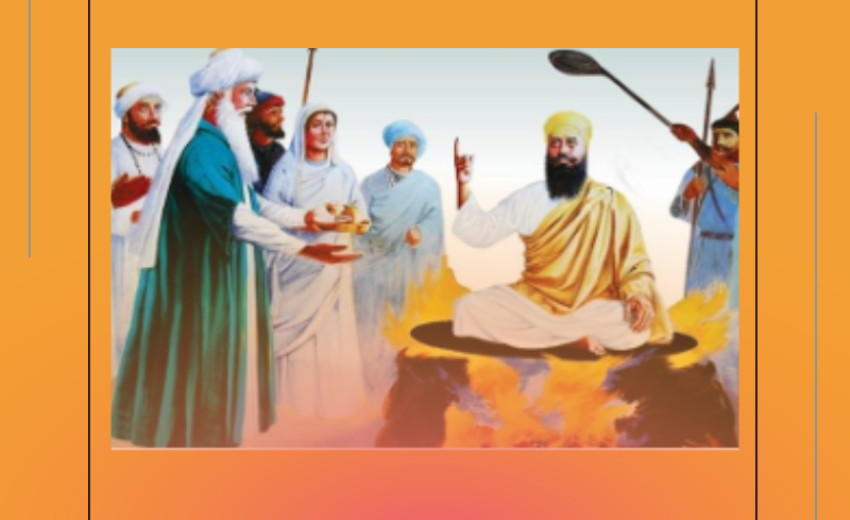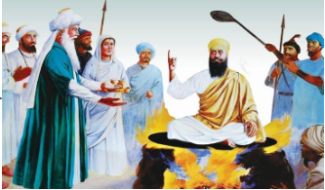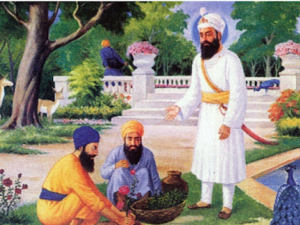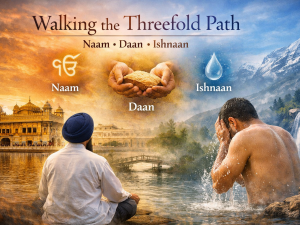The profound life and unparalleled sacrifice of Guru Arjan Dev, the fifth Sikh Guru, embody spiritual courage, universal compassion, and unshakable faith. His legacy encompasses his visionary contributions, including the compilation of the Adi Granth and the construction of the Harimandar Sahib. Through his life of humility, inclusiveness, and fearless acceptance of divine will, Guru Arjan Dev offers timeless lessons in resilience, justice, and servant-leadership, guiding humanity toward truth, equality, and inner peace in the face of adversity.
Introduction
The life and martyrdom of Guru Arjan Dev, the fifth Sikh Guru, stand as a timeless beacon of spiritual integrity, moral courage, and universal love. Born in 1563 and ascending to the position of Guru in 1581, Guru Arjan Dev was not only a profound spiritual guide but also a visionary builder of Sikh institutions. His contributions, both spiritual and social, as well as his literary and political achievements, are deeply woven into the fabric of Sikh identity. Yet, it is his supreme sacrifice in 1606 that crowns his legacy, offering humanity unparalleled lessons in resilience, justice, and divine surrender.
1. The Power of Spiritual Inclusiveness
One of Guru Arjan Dev’s most groundbreaking contributions was the compilation of the Adi Granth, the first authorized scripture of Sikhism, which later evolved into the Guru Granth Sahib. This holy text not only included the Sikh Gurus’ hymns but also incorporated the spiritual poetry of Hindu bhagats and Muslim saints, such as Kabir, Farid, Namdev, and Ravidas, among others.
Guru Arjan Dev taught the world that the Divine speaks in many tongues and wears many robes. In an era marked by religious divisions, his inclusivity was revolutionary. He reminded us that truth is not the monopoly of any single tradition, and that unity can be achieved not through conversion, but through recognition of divine essence in all. He emphasized:
ਏਕੁ ਪਿਤਾ ਏਕਸ ਕੇ ਹਮ ਬਾਰਿਕ…. ॥
Ek pita ekas ke ham barik, tu mera Gur haa-ee.
God is the one universal Parent of all creation, and all beings are His children. (M.5, SGGs, p. 611)
2. Service through Institutions: A Vision for Humanity
Guru Arjan Dev established the city of Amritsar as a central Sikh place of worship. He constructed the Harimandar Sahib (Golden Temple), deliberately placing its doors on all four sides, symbolizing openness to all people, regardless of caste, creed, or background.
ਖਤ੍ਰੀ ਬ੍ਰਾਹਮਣ ਸੂਦ ਵੈਸ ਉਪਦੇਸੁ ਚਹੁ ਵਰਨਾ ਕਉ ਸਾਝਾ ॥
Khatri Brāhmaṇ Sood Vais updes chahu varṇā kau sāñjhā.
The spiritual teaching is shared and common to all four castes – Kshatriyas, Brahmins, Shudras, and Vaishyas. (M.5, SGGS, p. 747)
This verse remains of immense importance today, as it challenges social divisions and promotes inclusive spiritual communities. It also reminds us that truth, love, and divinity are not bound by man-made categories. Thus, Guru Arjan dev emphasized that religious and social institutions must embody humility, hospitality, and harmony. The Harmandir Sahib remains a living monument to these values, where millions partake in langar (community kitchen) every year, seated together without discrimination. His vision speaks to modern societies that struggle with inequality and exclusion.
3. Fearlessness in the Face of Tyranny
Guru Arjan Dev’s martyrdom marks a pivotal moment in Sikh history. Under the rule of Mughal Emperor Jahangir, who sought to suppress the growing influence of Sikhism and impose orthodoxy, he was subjected to horrific torture; sitting on a hot iron plate while burning sand was poured over him. Despite this unimaginable suffering, Guru Arjan Dev maintained complete inner peace and recited:
ਤੇਰਾ ਕੀਆ ਮੀਠਾ ਲਾਗੈ ॥
Tera kee-aa meeThaa laagai.
Sweet is Thy Will, O Lord. (M.5, SGGS, p. 394)
Guru Arjan did not resist with weapons but chose spiritual defiance—a surrender not to oppression, but to God’s Will (Hukam). His martyrdom was not a defeat but a triumph of the human spirit. He taught that true courage is not in vengeance but in upholding truth with love and grace, even unto death.
4. Equanimity in Suffering: The Path of the Saint-Warrior
Guru Arjan Dev’s composed acceptance of torture illustrates a level of spiritual equanimity rarely witnessed in human history. While his physical body suffered, his soul remained unaffected. His sacrifice laid the foundation for the saint-soldier (sant-sipahi) ethos, which was later formalized by Guru Gobind Singh, the tenth Sikh Guru.
Guru Ji’s example teaches us to embrace life’s trials without becoming bitter or broken. In a world where many seek justice through retaliation, Guru Ji calls us to a higher path, responding with truth, not hatred; with firmness, not violence.
5. Living for Others: Compassion and Humility in Action
Throughout his life, Guru Arjan Dev served the downtrodden, uplifted the marginalized, and spread a message of love. He emphasized Naam Simran (meditative remembrance of God), and seva (selfless service).
ਮਿਲੁ ਸਾਧਸੰਗਤਿ ਭਜੁ ਕੇਵਲ ਨਾਮ ॥
Mil saadhsangat bhaj keval naam.
Join the company of the holy and meditate only on the Naam (God’s Name). (M. 5, SGGS, p. 12)
The above quote is an invitation and a command. It urges the seeker to seek uplifting company and fix their mind solely on the Divine Name for true spiritual awakening.
ਸੇਵਾ ਕਰਤ ਹੋਇ ਨਿਹਕਾਮੀ ॥
Sévaa karaṫ ho▫é nihkaamee.
One who performs selfless service, without thought of reward. (M.5, SGGS, p. 286)
The above verse is a profound teaching, reminding us that the highest form of service is one done without ego or expectation. Such service is not just helpful to others; it liberates the soul, refines the character, and brings one closer to the Divine.
Guru Ji did not rule from a throne of command, but from the hearts of the people. He worked with the farmers, broke bread with the poor, and poured himself into the welfare of the community. In modern times, when leadership is often synonymous with power, Guru Ji exemplifies that servant-leadership is the highest form of governance.
6. Divine Will and Contentment (Bhana and Contentment)
In the face of torture and death, Guru Arjan Dev Ji accepted God's Will with utter serenity. His words:
ਜੋ ਤੁਧੁ ਭਾਵੈ ਸੋ ਭਲਾ ਸਚੁ ਤੇਰਾ ਭਾਣਾ ॥
Jo ṫuḋʰ bʰaavæ so bʰalaa sach ṫéraa bʰaaṇaa.
Whatever pleases You is good; True is the Pleasure of Your Will. (M. 5, SGGS, p. 318)
This verse reflects the Sikh doctrine of Bhana (Divine Will) and the spirit of acceptance, characterized by patience and contentment. It teaches radical acceptance, that the universe unfolds not randomly, but according to a divine logic that transcends human understanding. Guru Arjan emphasized that suffering is not the end but a spiritual opportunity. Rather than seeking escape, he embraced every moment as a sacred offering. He reminds us that inner peace is not the absence of pain, but the presence of divine trust. Even in adversity, a soul anchored in faith can shine like a flame undeterred by the winds.
7. Martyrdom as a Call to Justice, Not Revenge
Guru Arjan Dev’s martyrdom did not spark calls for vengeance but became a turning point for self-defence and organized resistance. It awakened the Sikh community to protect the oppressed and stand up against injustice, yet always within the moral framework of righteousness. He articulated:
ਤਉ ਕੜੀਐ ਜੇ ਅਨਿਆਇ ਕੋ ਮਰਤਾ ॥
Ṫa▫o kaṛee▫æ jé ani▫aa▫é ko marṫaa.
We should feel sad if someone dies due to injustice. (M. 5, SGGS, p. 1140)
This verse teaches a profound ethical principle that punishment or condemnation is only justified when someone has suffered unjustly, especially resulting in death. It criticizes blind judgment, false blame, and punishment without cause.
In contrast to the cycles of violence seen in human history, Guru Arjan’s legacy teaches spiritual activism, resisting evil without becoming evil, and standing up without stooping to low levels. His martyrdom lit the flame that would one day inspire the Khalsa to rise, not for domination, but for dharam yudh, a righteous battle for truth and dignity.
8. A Living Martyrdom: Dying Daily for the Higher Cause
Guru Arjan Dev’s life itself was a daily martyrdom, not just his death. Every act of his life, whether compiling scripture, feeding the poor, or enduring suffering, was an act of divine surrender and service.
To live with integrity, love, and unwavering commitment to truth, even when inconvenient, is a form of martyrdom the world desperately needs. In today’s world of compromise and comfort, Guru calls us to live bravely, love fully, and serve humbly.
Conclusion: A Light that Never Dims
Guru Arjan Dev’s life and martyrdom are not relics of the past but living lessons for the present and future. He was not merely a historical figure, but a spiritual exemplar for all of humanity. His teachings challenge us to rise above narrowness, to embrace suffering with dignity, and to walk the path of love in a world torn apart by hatred.
In a single life, Guru Ji blended poetry with power, humility with heroism, and sacrifice with spiritual sovereignty. He gave humanity not just a scripture or a shrine, but a way of life.
As his words still echo through the Guru Granth Sahib:
ਜਿਸ ਕੇ ਸਿਰ ਊਪਰਿ ਤੂੰ ਸੁਆਮੀ ਸੋ ਦੁਖੁ ਕੈਸਾ ਪਾਵੈ ॥
Jis ké sir oopar ṫooⁿ su▫aamee so ḋukʰ kæsaa paavæ.
One who has You, O Lord, as their protector, how can they suffer? (M.5, SGGS, p. 749)
This verse beautifully expresses the complete trust and spiritual security one feels in the presence of Divine guidance and protection. It invites a shift from fear to faith, from anxiety to assurance, by remembering that if the Divine walks with you, you walk in strength. Thus, Guru Arjan Dev’s life is not just to be remembered, it is to be lived.







